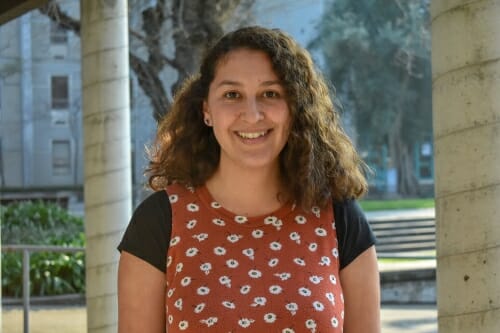New Faculty Focus: Nidia Bañuelos
Nidia Bañuelos: Research associate this year, and next year will start appointment as assistant professor in the Department of Liberal Arts and Applied Studies, Continuing Studies.
Hometown: West Lafayette, IN

Nidia Bañuelos
Educational/professional background: I have my BA from Stanford and my PhD in Sociology from the University of Chicago. I’m also a former librarian. Previously was a postdoctoral fellow in the School of Education, University of California Davis
How did you get into your field of research? I study the vocationally-oriented postsecondary institutions that educate the most college students each year, including community colleges and for-profit colleges and universities. My parents changed our family’s trajectory by going to community college and transferring to public universities. For this reason, I’ve always been interested in those schools that provide (or claim to provide) pathways out of poverty. I’m also hoping to learn more about how large public universities, like UW–Madison, can better support working students with family responsibilities.
What attracted you to UW–Madison? I really wanted to come back to the Midwest! Being at a great Midwestern university where people are doing interesting and important work on education is a real privilege.
What was your first visit to campus like? I came for my job interview just a few weeks after having a baby. I felt like I was stumbling around like a sleep-deprived zombie. But, everyone who organized my visit was very encouraging. It seemed like they were rooting for me to do well, rather than evaluating me. It gave me a really good feeling about the whole place.
What’s one thing you hope students who take a class with you will come away with? I want them to know that faculty work for them and that they are entitled to ask us for certain things. (Even if we end up saying “no”.) I like to give my students a chance to “practice” talking to a professor, especially if they have little experience with college and/or find faculty intimidating. This means they can come to office hours and talk about anything or nothing at all. Since I teach education courses, these non-topical conversations are very relevant – they’re working on building a new kind of social and cultural capital.
Is there a way your field of study can help the world endure and recover from the COVID-19 pandemic that has affected the health, finances and lifestyle of so many?Because they have to serve a broad range of students at different life stages, community colleges, for-profit universities, and other open access institutions have always been very innovative – particularly when it comes to online instruction. Although elite colleges and universities often set the tone for standard practice in higher education, there’s a lot we can learn from these “lower status” institutions. Especially right now.
Do you feel your work relates in any way to the Wisconsin Idea? The study of vocational and adult education is, I think, a natural fit with the Wisconsin Idea. Designing educational programs that can help a broad swath of Wisconsinites improve their lives and the lives of those around them is a central concern of my department.
What’s something interesting about your area of expertise you can share that will make us sound smarter during video chats (and eventually parties)? For-profit colleges and universities get most of their revenue from federal financial aid. This is because, in 1972, Congress passed a little-known law granting profitmaking colleges access to federal money. At this same time, the Department of Education pushed for accrediting agencies to approve for-profit schools. The feds weren’t sure what to do about a growing interest in college among working adults and hoped these non-traditional institutions could help meet the demand.
Hobbies/other interests: I like singing and playing music with my family. I play the accordion and my partner plays the guitar. Our kids play anything they can whack with a stick.



